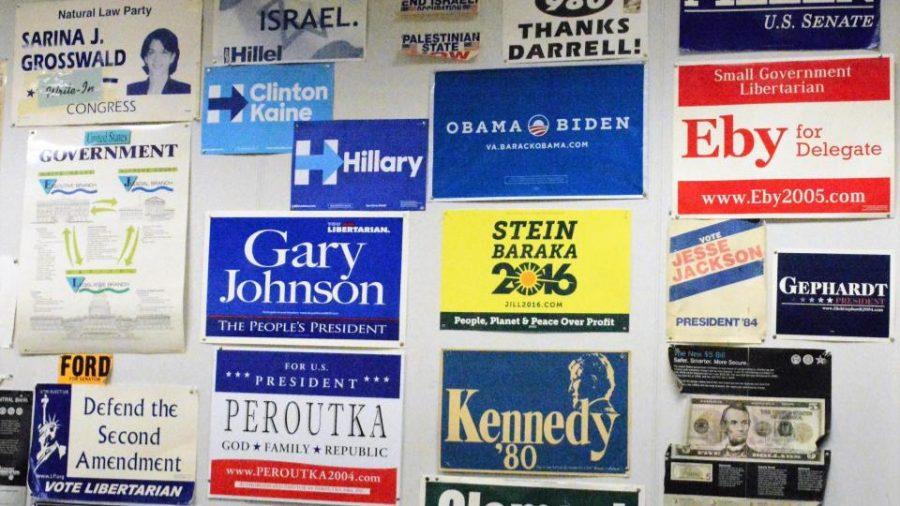To Speak, or Not to Speak, That is the Question: On Sharing Political Opinions in the Classroom
After a tense campaign season, faculty and students reflect on free speech in the classroom

Social Studies teacher Joe Clement displays a wide variety of political campaign signs in order to promote a balanced discussion of politics in the classroom.
December 9, 2016
The freedom of speech is one of the most valued rights Americans hold as citizens. In light of the recent presidential election, Americans have actively seized the opportunity to express their opinions. In the public school setting, however, employees are somewhat restricted on what they may discuss in class, or share of their own views on sensitive issues.
The county has put certain guidelines in place to regulate discussion of hot-button topics, especially those of political nature. In anticipation of the presidential election, Principal Teresa Johnson sent reminders to teachers of the exact regulations.
“This was an exceptionally emotional campaign and election, so I want to continue to encourage teachers to follow regulation,” Johnson said. “Teachers tend to be public figures and [the county doesn’t] ever want teachers to influence how a student thinks.”
The county policy clearly outlines faculty standards ranging from not wearing political promotional apparel to school, to not participating in any way in a political campaign during school or work hours.
According to FCPS policy, “Instructional personnel may discuss political issues with students as part of the instructional program, following FCPS guidelines to ensure balanced and critical review of issues.”
Students appreciate the opportunity to express their opinions on hot topics debated throughout the election season, but in the classroom environment it is essential for the teacher to promote a balanced discussion and encourage students to be respectful of those who have differing views.
“I feel like [teachers] should [be able to share personal opinions in class], but to a certain extent,” senior Sofia Gonzalez said. “Politics affects everyone, so I feel that we should be able to talk about that.”
This election has been especially hard on teachers, particularly since many controversies and moral issues were raised regarding the candidates. Campaign rhetoric and scandals sparked discussion and debate throughout the country, and this dialogue did not stop outside the schoolhouse gate.
Since FCPS policy states that faculty members may discuss politics as long as the discussion remains balanced, teachers should promote open discussion among students and should encourage them to develop their own opinions while respecting those of others.
“Teachers are members in society,” Johnson said. “They are looked upon, as someone of influence, of authority, so [the county wants] to make sure that they’re not influencing students in any way with one opinion or another.”
Teachers need to remain mindful of how students might be impacted in class, and tactfully address political issues, which can be challenging.
“I tried to make [discussion about the election] not about policy, but I said that in my classroom there will be no discrimination,” English teacher Mike Murphy said. “We have always been about tolerance, accepting everyone no matter what your demographics may be.”
Regardless of your own political views, it is important to be able to have a healthy, balanced discussion and forum for sharing ideas. The classroom can be the perfect place for this dialogue, as long as all participants, including the teacher, remain open-minded and respectful.

